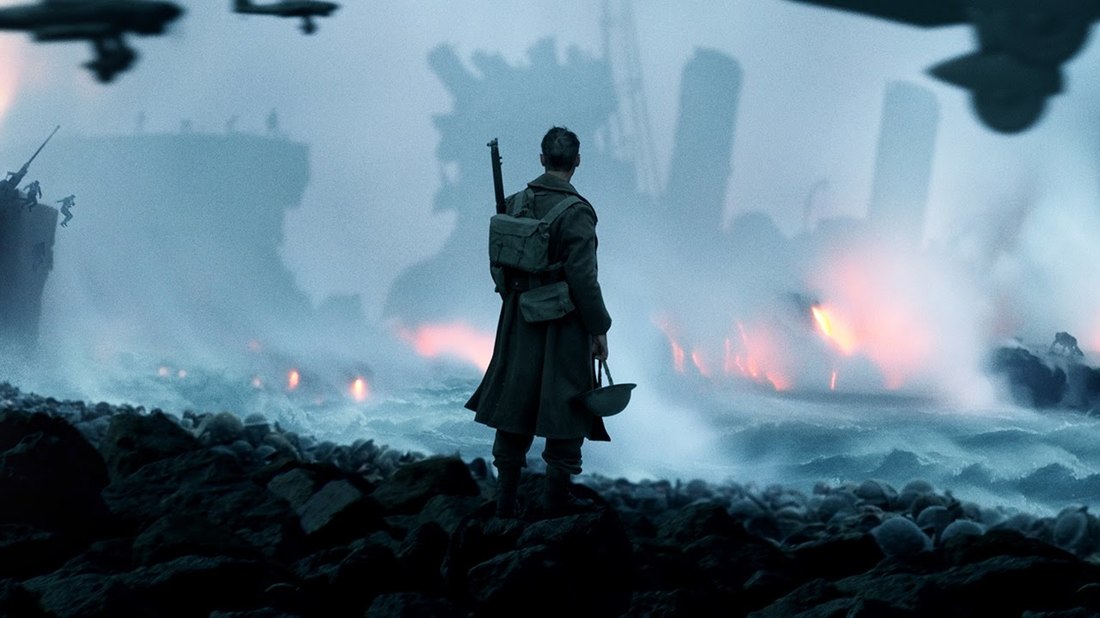Before I saw the film, I was puzzled at the film’s run-time: 106 minutes, Nolan’s shortest feature since his feature-length debut Following released nearly twenty years ago, and a full hour shorter than his last two features (Interstellar and The Dark Knight Rises). The reason for this became apparent as soon as the film started: if it was any longer than that, it would give audience members heart attacks. Dunkirk is one of the most intense and visceral films I have ever experienced. The tension starts immediately, when British soldiers come under sniper fire in the first scene, and does not stop until the credits start rolling. The film is relentless and does not give you time to take a breath- our heroes are constantly at risk from sniper fire, mortar shells, torpedo attack, dive bombers…the list goes on. The film barrels along like a runaway freight train, as soldiers desperately escape one death trap only to immediately fall into another.
When I saw Dunkirk, it was screened in the pseudo-IMAX screen at the AMC Boston Common, and even without a full IMAX set-up it was one of the most intense film experiences I have ever seen. The film’s sound design is incredible, and when combined with an IMAX sound system you really do feel like Nolan just threw you into a battlefield. I can’t imagine what this film is like on a full-size IMAX screen, but I fully intend to find out. Be warned though, this is not a film for the faint of heart, young children, or people with heart problems. Because at the end, it almost did feel like I had been holding my breath for 106 minutes.
Unlike most of Nolan’s past films, Dunkirk places a huge emphasis on tension, and Nolan executes this masterfully to keep you on the edge of your seat at all times. In this film, objects as innocuous as a door lock or a fuel gauge become focal points of unbearable anxiety, threatening death the same as any bomb or bullet. And the tension-building is not limited to the visual, either. The film’s score is very unique, because just like the suspense in the film it never stops- it begins in the first scene and keeps going as one continuous stream until the credits. The centerpiece of the score is a ticking clock, and although (metaphorical) ticking clocks are extremely effective in building suspense in a film, I never thought a literal one could be used so effectively.
Like most Nolan films, the film is visually incredible. Nolan worked with the cinematographer Hoyte van Hoytema on Dunkirk, who also worked on his previous film Interstellar, yet this probably surpasses that film. Some of the shots in this movie were simply jaw-dropping and I don’t understand how they pulled them off. Either Hoytema was somehow able to cram an IMAX camera into a Spitfire, or else they used some of the most convincing practical effects I’ve ever seen. In fact, nearly all the effects in this movie were practical: they really did fly Spitfires around to get amazing aerial photography and use real Royal Navy ships instead of painting them into the scenes in post-production. Unlike the heavy CGI style which has become the Hollywood standard nowadays, films such as this with practical effects and great cinematography will never look outdated.
The only minor complaint I have about the movie is the that fact that it uses a non-linear narrative structure, which makes the film a little hard to follow at certain points. However, I understand why Nolan elected to use this style. By showing the scenes out of order, he is able to depict the land, sea, and air portions simultaneously, something which would not have been possible had he shown them sequentially. This, in turn, would not create the same level of intensity as showing them all at once. So even if it’s a tiny bit confusing, I view it as a small price to pay to achieve the desired result.
In many ways Dunkirk is not a war movie in the conventional sense. Rather than being about winning a battle or defeating an enemy, it is about survival. Essentially, it is a 106 minute war epic about running away. And yet, in war, sometimes mere survival is victory. Dunkirk, more than any war movie I’ve ever seen, truly communicates the chaos and terror that is a battlefield. It is incredible in every way, and is yet more evidence that Nolan is one of the greatest directors of our time. I could talk about this film even more, but it’s just making me want to go see the movie again. Which I will, on a true IMAX screen this time. I highly recommend that you do the same.
Grade: A+

 RSS Feed
RSS Feed
